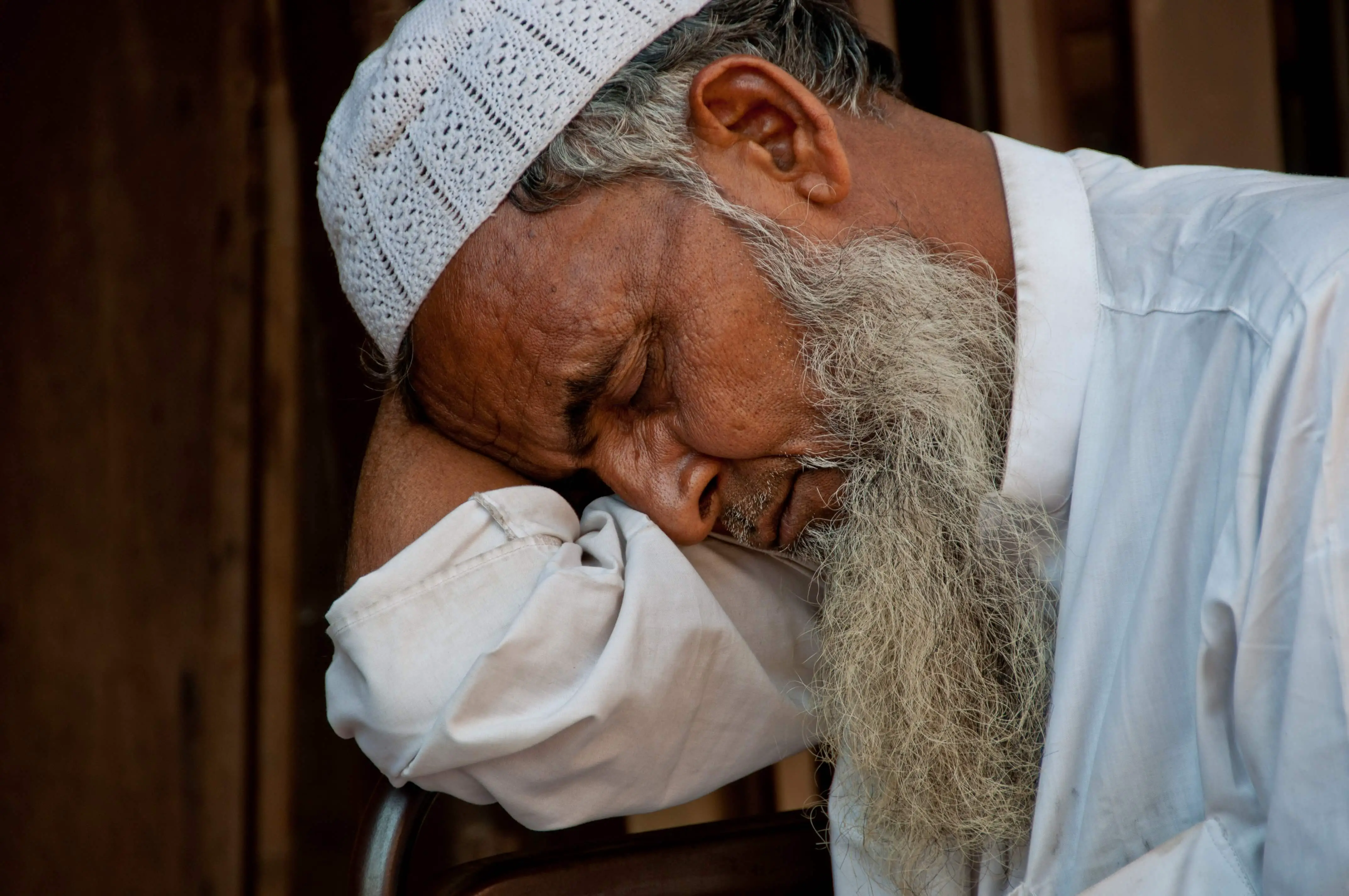What should you do when entering a cemetery?
It is important to be aware of the grieving people around you and maintain a respectful and somber demeanor (e.g., do not laugh, make jokes, speak loudly, etc.)1. As you enter a Muslim cemetery or the Muslim area of a cemetery, face the graves and say “Salam.” Then say a prayer for the deceased and yourself.
You have the option to recite the supplication the Prophet Muhammad (S) used to recite when visiting graves2.
السَّلَامُ عَلَيْكُمُ أَهْلَ الدِّيَارِ مِنَ الْمُؤْمِنِينَ وَالْمُسْلِمِينَ
وَإِنَّا إِنْ شَاءَ اللَّهُ بِكُمْ لَاحِقُونَ أَسْأَلُ اللَّهَ لَنَا وَلَكُمُ الْعَافِيَةَ
Transliteration: Assalaamu ‘alaykum ‘ahlad-diyaari, minal-mu’mineena wal muslimeena, wa ‘innaa ‘in shaa’ Allaahu bikum laahiqoona ‘as’alullaaha lanaa wa lakumul- ‘aafiyata.
Translation: Oh, Muslims residing here, salaams on you, by the will of Allah we will also be coming to you. We seek safety for us and you.
Note, you can say whatever duas or supplications that come to your heart. The above dua is a recommendation and has other variations.
What are the benefits of visiting a cemetery after a loved one has passed on?
There are multiple benefits to visiting the grave for both the visitor and the deceased.
Visiting the grave is a recommended act by the Prophet (S) in order to remind the visitor of death and the afterlife. According to the Hadith, by Abu Hurairah, the Messenger of Allah (ﷺ) said:
“Visit the graves, for they will remind you of the Hereafter.”3
The visitor also increases in God-conscious. According to the Hadith by Ibn Mas’ud that the Messenger of Allah (ﷺ) said,
“I used to forbid you to visit the graves, but now visit them, for they will draw your attention away from this world and remind you of the Hereafter.”4
For the deceased, when someone visits the grave and makes dua for them, they are comforted by the duas. According to Ibn Qayyim al-Jawvziyya, a scholar, the deceased feel joy when they are visited.5
Are there specific prayers that I can make at the grave of my loved one?
When you get to the grave of your loved one, you can make duas for them and recite Qur’an as a reward for the deceased6. It is also okay to recite Surah Ya-Sin7 and as well as duas for the deceased. If someone doesn’t know Surah Ya-Sin, they can recite whichever Surahs they know with the intention of the reward going to the deceased8.
As a form of etiquette, Imam Ghazali says that the person visiting the deceased should make dua for the deceased, for themselves, and derive a lesson9.
Is it ok to bring flowers to the grave?
Generally speaking, adornment and beautification of a grave should be avoided. Creating any type of shrine or monument in an effort to elevate a person’s worldly status is prohibited. There is no inherent benefit to the deceased when you bring flowers, candles, pictures, etc., and place them on top of the grave.
With that in mind, there is no strict prohibition on bringing flowers, etc.; however, it was not an established Sunnah, the practice of the Prophet Muhammad (S), or a practice of the Sahabah, his Companions10. An often-quoted hadith, reported by Ibn Abbas (R), related to this is when the Prophet (S) placed two twigs on two graves to ease the punishment for two individuals:
The Messenger of Allah (ﷺ) happened to pass by two graves and said: They (their occupants) are being tormented, but they are not tormented for a grievous sin. One of them carried tales and the other did not keep himself safe from being defiled by urine. He then called for a fresh twig and split it into two parts, and planted them on each grave and then said: Perhaps, their punishment way be mitigated as long as these twigs remain fresh11.
However, analogizing placing the twigs to putting flowers on the grave is a false analogy. The Prophet (S) received a revelation that the people in the grave were suffering. However, we are not privy to that knowledge. In lieu of flowers, if a person makes a donation in the name of the deceased, they will benefit from it in the grave.12
How should one stand in relation to the grave?
It is important to make sure when visiting the grave that you don’t stand on the graves or walk on top of them.13 In addition, graves should not be turned into pathways, dwellings14, or places of worship. The deceased are given the same respect in their graves as when they were alive. Just like a living person is not walked on, a deceased person is also not walked on.
This is supported by the Hadith reported by Abu Marthad al-Ghanawi, where Allah’s Messenger (ﷺ) said:
“Do not sit on the graves and do not pray facing towards them.”15
Are you allowed to cry at the grave?
There are Hadith that prohibit wailing at the graves. For example, It was narrated that ‘Umar said:
“I heard the Messenger of Allah say: ‘The deceased is punished in his grave due to the wailing over him.”‘16
In the Arab culture, during the time of the Prophet (S), professional wailers were hired to make a show of mourning for the deceased. They would be over the top with the wailing and do it for the purposes of showing off – the more wailing, the more “important” a person was. Therefore, Islam came in and forbade these types of behaviors.
However, it is okay to cry at the graves, so long as the person is composed and the tears are natural; not for showing off. If someone is so overcome with grief that they can’t contain themselves, then it is recommended they come back when they are more composed, so they don’t disturb the others around them and the deceased.17
What things are you not allowed to do when visiting a grave?
It is forbidden to wail at the grave. In addition, a mourner should not do self-harm when visiting the grave, such as slapping their cheeks, tearing their clothes, destroying wealth, etc. This is based on the Hadith, where `Abdullah narrates that:
“The Prophet (ﷺ) said, ‘He who slaps the cheeks, tears the clothes and follows the tradition of the Days of Ignorance is not from us.’”18
In addition, the mourners should not purposefully make their hair look disheveled or shave their heads in mourning. It was narrated Abu Burda bin Abi Musa:
Abu Musa got seriously ill, fainted and could not reply to his wife while he was lying with his head in her lap. When he came to his senses, he said, “I am innocent of those, of whom Allah’s Messenger (ﷺ) was innocent. Allah’s Messenger (ﷺ) is innocent of a woman who cries aloud (or slaps her face) who shaves her head and who tear off her clothes (on the falling of a calamity) .19
Can women go to the graveyard?
The scholars have 3 main opinions on women visiting the graveyards.
- It is allowed for women to visit the graveyard just as it is allowed for men.20
- It is disliked for a woman to visit the graveyard.21
- It is forbidden for a woman to visit the graveyard. 22
For a deeper analysis of this topic and the reasons for varying opinions, see the article, “Can Muslim Women Attend A Muslim Burial?”
References
- A Practical Guide to Funeral Rites in Islam by Maulana Ebrahim Noor, pg. 42
- Sunnah.com, Sahih Muslim, Hadith 975
- Sunnah.com, Sunan Ibn Majah 1569
- Sunnah.com, Sunan Ibn Majah 1571
- Kitabu’r-Ruh, 10, Ibn Qayyim al-Jawvziyya
- A Practical Guide to Funeral Rites in Islam by Maulana Ebrahim Noor, pg. 42
- A Practical Guide to Funeral Rites in Islam by Maulana Ebrahim Noor, pg. 42
- “Forgotten Sunnas: Visiting Graves”, by Shaykh Jamir Meah
- “Forgotten Sunnas: Visiting Graves”, by Shaykh Jamir Meah
- “Flowers on Graves” by Moulana Yusuf Laher, Checked by: Mufti Siraj Desai
- Sunnah.com, Sahih Muslim 292a
- A Practical Guide to Funeral Rites in Islam by Maulana Ebrahim Noor, pg. 40
- A Practical Guide to Funeral Rites in Islam by Maulana Ebrahim Noor, pg. 41
- “It is not permissible to show any kind of disrespect towards graves”, Supervised by Shaykh Muhammad Saalih al-Munajjid
- Sunnah.com, Sahih Muslim, Hadith 972a
- Sunnah.com, Sunan an-Nasa’i 1853
- A Practical Guide to Funeral Rites in Islam by Maulana Ebrahim Noor, pg. 31
- Sunnah.com, Sahih al-Bukhari 1297
- Sunnah.com, Sahih al-Bukhari 1296
- “What is the ruling about women visiting the cemeteries?” Fatwa No: 84400
- “Permissibility of women visiting graves”, Supervised by Shaykh Muhammad Saalih al-Munajjid
- “Ruling on women visiting graves”, Supervised by Shaykh Muhammad Saalih al-Munajjid
“Does weeping and shedding tears for the deceased cause him any harm?”, Supervised by Shaykh Muhammad Saalih al-Munajjid, https://islamqa.info/en/answers/33866/does-weeping-and-shedding-tears-for-the-deceased-cause-him-any-harm
“Forgotten Sunnas: Visiting Graves”, by Shaykh Jamir Meah, https://seekersguidance.org/articles/beneficial-knowledge/forgotten-sunnas-visiting-graves/
“It is not permissible to show any kind of disrespect towards graves”, Supervised by Shaykh Muhammad Saalih al-Munajjid, https://islamqa.info/en/answers/4309/it-is-not-permissible-to-show-any-kind-of-disrespect-towards-graves
“Permissibility of women visiting graves”, Supervised by Shaykh Muhammad Saalih al-Munajjid, https://islamqa.info/en/answers/127/permissibility-of-women-visiting-graves
“Ruling on women visiting graves”, Supervised by Shaykh Muhammad Saalih al-Munajjid, https://islamqa.info/en/answers/8198/ruling-on-women-visiting-graves
“What is the ruling about women visiting the cemeteries?” Fatwa No: 84400, https://www.islamweb.net/en/fatwa/84400/women-visiting-graves
“Flowers on Graves” by Moulana Yusuf Laher, Checked by: Mufti Siraj Desai https://islamqa.org/hanafi/askmufti/45521/flowers-on-graves-2/
Sunnah.com, Jami` at-Tirmidhi 1056, https://sunnah.com/tirmidhi:1056
Sunnah.com, Sahih al-Bukhari 1296, https://sunnah.com/bukhari:1296
Sunnah.com, Sahih al-Bukhari 1297, https://sunnah.com/bukhari:1297
Sunnah.com, Sahih Muslim 292a, https://sunnah.com/muslim:292a
Sunnah.com, Sahih Muslim, Hadith 975, https://sunnah.com/muslim:975
Sunnah.com, Sunan an-Nasa’i 1853, https://sunnah.com/nasai:1853
Sunnah.com, Sunan Ibn Majah 1569, https://sunnah.com/ibnmajah:1569
Sunnah.com, Sunan Ibn Majah 1571, https://sunnah.com/ibnmajah:1571




